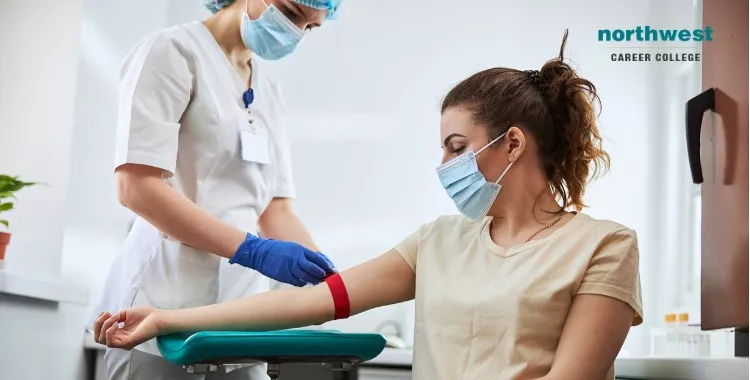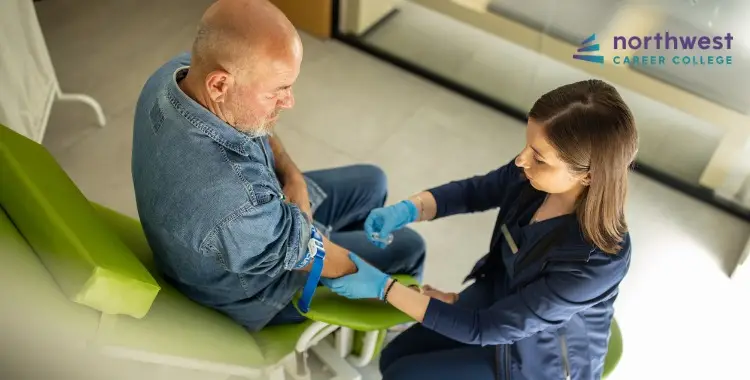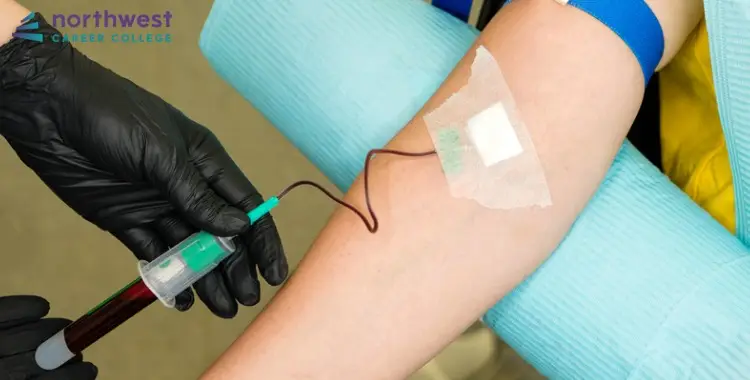What is Phlebotomy? A Comprehensive Guide
- Phlebotomy Technician
- October 25, 2024
- 4.9k views
- 5 min read

Phlebotomy is a medical field that involves the drawing of blood from patients for diagnostic or therapeutic purposes.
It is an important part of the medical profession, and those who work in this field are responsible for ensuring that patients receive the best possible care. In this article, we will discuss what phlebotomy is and provide a comprehensive guide to its practice!
Read More: Why Would a Patient Need Phlebotomy?
Table of Contents
A brief history of phlebotomy
The practice of phlebotomy has its roots in ancient times. It is thought that the first recorded instance of bloodletting occurred in Egypt around 1600 BCE. The Ebers Papyrus, a medical text from this time period, describes the use of sharpened copper instruments to make incisions in the skin and draw blood.
In the centuries that followed, bloodletting became a widely used medical practice. It was believed to be effective for a wide range of conditions, including headaches, fevers, and even obesity.
While bloodletting fell out of favor in the early 20th century, it is still used occasionally today for some conditions. For example, it may be used to treat hemochromatosis, a condition that causes the body to absorb too much iron.
How is phlebotomy used in modern medical science?
Phlebotomy technicians, also called phlebotomists, are trained healthcare professionals who perform phlebotomy procedures. They work in hospitals, clinics, and blood donation centers.
Phlebotomy is used for a variety of reasons. It can be used to diagnose and treat medical conditions. It can also be used to monitor a patient’s progress after treatment or to screen for certain diseases or conditions.
In some cases, phlebotomy may be used as a preventative measure. For example, it may be used to remove excess iron from the body before it can cause damage.
Phlebotomy is generally safe and complications are rare. However, as with any medical procedure, there is always a risk of complications. These risks should be discussed with your doctor before you undergo any phlebotomy procedures.
What are the different types of phlebotomy?
There are two main types of phlebotomy: venipuncture and capillary puncture. Venipuncture is the most common type of phlebotomy. It involves taking blood from a vein, usually in the arm.
Capillary puncture is less common than venipuncture, but it can be used when veins are not accessible or if a large amount of blood is needed. It involves taking blood from a small vessel in the skin, such as a finger or toe.
Phlebotomy can also be divided into two categories: therapeutic and diagnostic. Therapeutic phlebotomy is used to treat conditions like iron overload or polycythemia vera. Diagnostic phlebotomy is used to test for conditions like anemia or bleeding disorders.
How is phlebotomy performed?
If you need to have blood drawn, your doctor will likely order a venipuncture. This is a type of phlebotomy procedure that involves using a needle to draw blood from a vein in your arm. The technician will clean the area with an antiseptic, insert the needle, and then collect the blood in a tube. Once the procedure is complete, they will apply a bandage to the area.
You may experience some bruising and soreness after the procedure, but this should go away within a few days. In rare cases, more serious complications can occur, such as infection or damage to a nerve.
If you have a fear of needles or are worried about pain, talk to your doctor or phlebotomist beforehand. They can help put you at ease and make sure that you are comfortable during the procedure.
Phlebotomy is a safe and relatively simple medical procedure that plays an important role in healthcare. It can be used to collect blood for tests, transfusions, or research. With proper training, phlebotomists can help make a difference in the lives of others.
How to become a phlebotomist?
In order to become a phlebotomist, you will need to complete an accredited phlebotomy training program. Upon completion of the program, you will be eligible to take the national certification exam. Once you have passed the exam, you will be a certified phlebotomist and can begin working in healthcare!
If you are interested in becoming a phlebotomist, consider enrolling in NCC’s Phlebotomy Program. The program is accredited by the National Accrediting Agency for Clinical Laboratory Sciences (NAACLS) and prepares students for a career in healthcare.
Upon completion of the program, students will be eligible to take the national certification exam. For more information, please visit our website or contact us today!
If you are interested in a career in phlebotomy, or if you need more information on what is involved in the process, please contact us today. We would be happy to answer any of your questions!

Start your new career today
At our phlebotomy school, we pride ourselves on providing one of the premier Phlebotomy Schools in Las Vegas.
Our established and seasoned instructors will take you through every aspect of Phlebotomy and Northwest offers day, afternoon, and night classes to accommodate your busy Las Vegas work and family schedule. Call us today at (702) 403-1592 to speak to one of our admissions specialists about your new Phlebotomy career.



